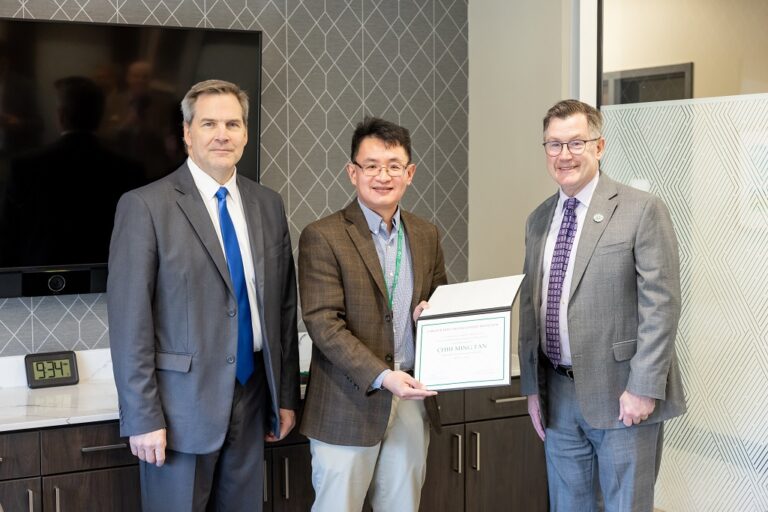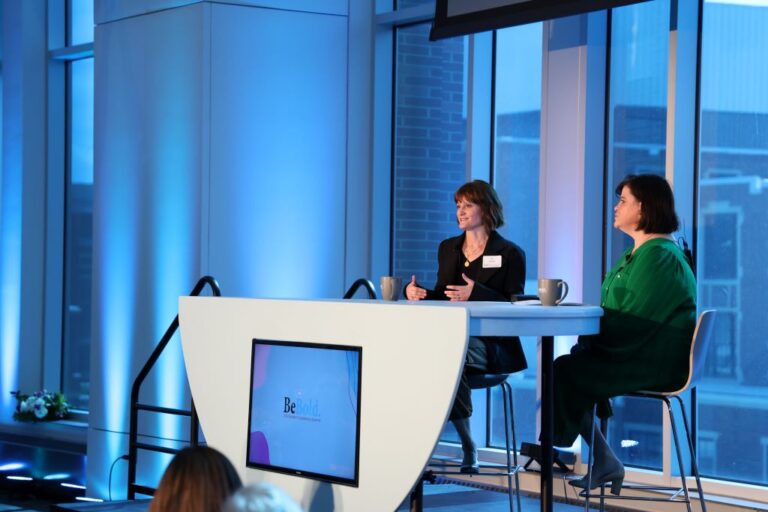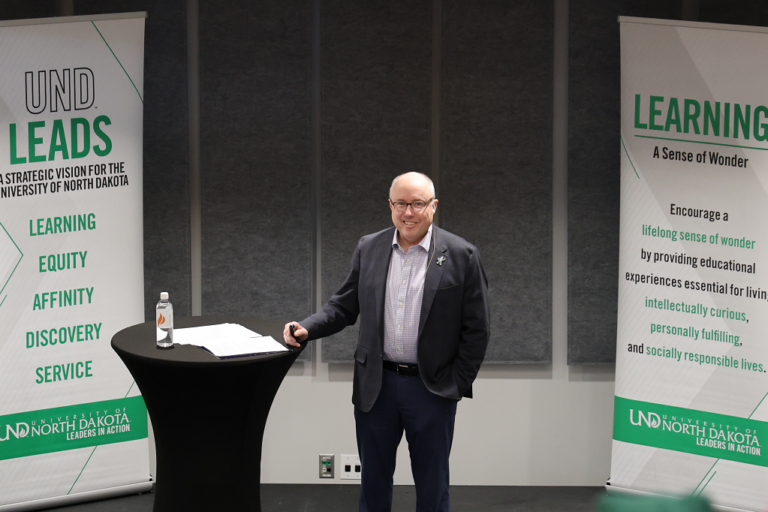UND’s financial future: A conversation with Karla Mongeon-Stewart
New VP for finance & operations/COO talks career, budgets and the long-term outlook for UND

Editor’s note: In July, Karla Mongeon-Stewart was named by President Andy Armacost to be UND’s vice president for finance & operations/COO. Recently, UND Today talked with Mongeon-Stewart about her new position and her thoughts about higher education financing and UND. The interview has been lightly edited for clarity.
****
Let’s start by talking about your background. What led you to the world of finance and ultimately to working for UND?
Well, I was always good at science and math growing up — that was of particular interest to me. Then I took an accounting class in high school, and I loved it. I thought, “This is something I would enjoy doing.” From that class, I decided to major in accounting, went to college and loved the classes. I decided that was the path I wanted to take.
When I graduated from NDSU, I got a job as a finance director trainee for what was then Lutheran Health Systems, which had a huge presence in Fargo and throughout the Midwest. I really credit them for the success that I’ve had, because, at a very young age, I got to jump into finance leadership. I had the mentoring and the training that I needed to be successful in that realm.
After several years of working in health care, I took a job at Bismarck State College serving as their director of finance and operations. That’s what started my career in higher ed, and I worked there for about five years. I also worked at my alma mater NDSU for a time, as well as at institutions as far away as Brownsville, Texas. So, I gained experience at institutions ranging from a small, private liberal-arts college to several state universities. I was happy to bring that experience to UND.
I came to UND seven years ago as the associate vice president for finance. We made Grand Forks our home, and I’m so blessed to have had the opportunity to grow, learn and be mentored by some amazing peers. Alice Brekke and Jed Shivers, my predecessors, were phenomenal mentors who included me in decision-making and gave me opportunities to use my skills and abilities and hone skills that I needed to develop. I think that really prepared me for this role. That’s my journey to this position!
So, in transitioning into the vice president role, what have you enjoyed about adjusting to this executive position on campus?
I would say the opportunity to be involved early in the strategic vision of the university and where we want to go, as well as helping educate people on how finance and operations contribute to that strategic planning — how important that piece is.
I really view this vice president role as being a financial professional who needs to communicate effectively. It’s about getting out there; working with people; helping others understand how finance and operations play a role in business decisions; what we can do to help; how things can be structured; why we can’t do things sometimes; also offering other ways we can do things — being creative and thoughtful to help UND move forward.
What are your thoughts on UND’s overall financial health?
I think, overall, UND is financially positioned very well. Higher education, as an industry, is in a challenging time with the overall, national decrease in college-ready or college-aged, traditional students. We’re also in an environment where we need to pivot quickly and change to meet the needs of society and our students.
Public higher education is traditionally slow-moving. I look at us as like a big blue whale; we don’t turn quickly, we’re steady. But to thrive in the new higher education environment, we’re going to have to learn how to pivot more quickly and think more about the unknown, and how we can reinvent ourselves for the needs of our students and our world.
Careers are changing, students are changing, and student needs are changing. If we’re going to be relevant in the future, we need to figure out how we can adapt quickly and apply our resources in ways that really benefit our students and society as a whole.
Where does the university get its money to operate?
Our primary source of revenue is tuition and fees, which represents about 36% of our operating budget. Then, grants and contracts make up about 28%, and state appropriations provide 21%.
We also have local resources from our auxiliaries, such as housing and dining and athletics ticket revenues, revenues that we get from providing services to the community.
Inflation and the economy are making headlines and affecting markets. How do these effects reach UND? Where do you see impacts in your role?
It’s multifaceted. My primary concern is retaining the workforce that we have, because inflation, at the end of the day, is impacting our families, the families of our employees. How are we able to stay competitive in a market so that these employees don’t move on and go somewhere else?
Again, as a state agency, we are not traditionally able to respond as quickly as the private sector in addressing inflation through increasing prices, etc., to increase our salaries. That’s because a lot of times our tuition rates are informed by the state Legislature and State Board of Higher Education. Our state appropriation is designated by the state Legislature every two years, which creates barriers in addressing inflation in a timely manner.
So, a concern I would have is being able to respond quickly with salary adjustments in order to stay competitive in the market and not lose valuable faculty and staff.
We also have to acknowledge the role hybrid and remote work plays in today’s environment. We could potentially lose important staff and faculty expertise if employees choose to stay in Grand Forks but work at a job in a different city due to the availability of remote or hybrid work.
However, I also view it as a positive. We are now able to recruit talent that we wouldn’t otherwise be able to because the market can now be opened to the whole country, even if they are unable to relocate to Grand Forks. So, I think the fact that we did such a good job during COVID at expanding our technology and our capabilities is a strength for UND.
From an operations perspective, I worry about supply costs and how we can keep our budgets in line without making significant increases in operating budgets or decreases in quality. Are we able to get what we need in a timely fashion? Are we keeping inventory on hand for those must-have items? Are we able to get what we need?
From a construction point of view, there has been significant inflation that can and will impact budgets. With some of the capital projects that we would like to proceed with, are we going to have the dollars needed to pursue those projects at the quality that we desire?
What’s your sense of the biggest financial challenges for UND over the next few years? In other words, what keeps you up at night?
I alluded to this earlier, but it’s more the enrollment and keeping us competitive for students so that we continue to have a source to draw from for future enrollments. I think that is going to be achieved by setting ourselves apart from other institutions. What is it that we provide that they’re not going to get somewhere else?
Along those lines, the beautification of campus in recent years has been phenomenal. And I think that’s going to help improve recruitment and retention of our students.
At the end of the day, it’s all about students. UND needs to be focused on balancing the needs of our students with our financial resources to keep higher education affordable and a high-quality experience. If students aren’t choosing us, it doesn’t matter what we do.
On the flip side, what do you see as some of UND’s biggest strengths? What helps you sleep easily?
I think we have a wonderful leader in President Armacost. He has a good sense of what the needs of the institution are, is very collaborative and works to include multiple opinions in making decisions. I think that’s important. You don’t only want the people who agree with you. You want to make sure that you have a well-rounded discussion about the decisions that are moving the University forward.
So, I think that leadership is a huge strength.
The staff and faculty here are committed; they love UND. You don’t see that everywhere.
And we have a relatively strong financial position. So, we’re able to do things that other institutions won’t be able to do.
In July, you talked to President Armacost, and one of the topics was the upcoming legislative session. Do you have any updates as to how UND is preparing for that?
The president and I talk about it weekly. Our leadership team attends events that are affiliated with the session and process to make sure that we’re networking with people, understanding what the issues are and getting a good sense of what the Legislature is expecting from us — understanding the needs and desires of the communities and the people we serve.
I think an important piece of preparing for the session is doing this work, connecting with people. That way, the first time they see us is not when we’re asking for something, but when we’re meeting with lawmakers and community members, listening to them about their wants and needs in connection to higher education.
Earlier, you touched on retaining faculty and staff. What’s your sense of how the North Dakota University System will approach the issues of retention and wage increases for university staff and faculty?
I think the State Board of Higher Education is very aware of the issues and concerns, and they’re going to fight hard for us during the legislative session. Part of getting funding for anything is telling your story. We need to have facts to back up what we’re saying. So, we, as a leadership team, have been looking at factors such as turnover, or how many searches have we had that have failed? How many times have we had our No. 1 candidate decline a position due to salary? These are important data to help tell our story.
You’ve been with the University for seven years. This legislative session won’t be your first. How will your role change now that you’re a vice president, compared to past sessions in which you’ve taken part?
As I mentioned earlier, Jed and Alice were wonderful mentors. They included me in the legislative process in previous years, so I feel prepared and poised to serve in this new role because I have that experience.
Also, I worked for BSC and NDSU, so I feel educated about state politics and what goes on in other institutions. I think that’s a benefit, in my position.
And I’m a North Dakota native. I understand the politics of North Dakota and what it takes to get things done.
In previous sessions, I was always behind the scenes, preparing testimony and spreadsheets and figuring out how we should tell the story. Now, I’ll be the presenter. That’s going to be the biggest change for me — being that person out front telling our story and getting buy-in from others on our needs and why they’re important.
How do you and your team plan to keep UND informed about financial and operational developments that impact what happens on campus?
I think this is an area in which UND has grown tremendously in the seven years that I’ve been here. We really look at this as an all-encompassing, campuswide task. We meet quarterly with every division to talk about where they’ve been, where they’re at, where they’re going and what they’re going to need to get there.
We also look at their struggles, areas for growth and efforts where they might need to infuse one-time funding. This is a much more transparent process than it’s ever been, historically. I think those meetings provide an opportunity for us to solve problems as a team, not in silos, which I think is a huge benefit to UND.
I think we’re going to make better strategic decisions as a University because we’re involving a lot more people on the front end of strategic planning, vision and financial investments. I think that’s going to help set us up for success in the future.
Was that more open process brought about by the financial downturn North Dakota experienced early in the past decade, which shifted the University’s finances and operations?
Yes, and I think our budget model, which is either lovingly or malevolently called MIRA [Model for Incentive-based Resource Allocation], has provided us those opportunities to be transparent and to have open and honest discussions about where our money goes and why. The MIRA model is just a model that is used to analyze the inflows and outflows of revenues and expenses to the University. However, it is just a model, and the leadership of the University uses the model to help inform decisions. The model itself is not a decision-maker.
In a historical model, all the money is centralized, and then the president and vice presidents allocate the resources how they see fit. In this model, the revenue follows the generation of that revenue, whether through tuition generation, credit-hour generation or auxiliary revenues generated through providing goods and services. The deans and directors play a much larger role in where our resources are spent. They understand their programs not only in their quality, but also which programs generate income for their colleges. And they understand their expenses. They also understand the centralized expenses of running a university.
In a historical model, these expenses are essentially “taken off the top.” In the MIRA model, expenses are allocated out of the colleges and units based on metrics that make sense for the type of expense being allocated. For example, Facilities expenses are allocated to the units based on square feet. These centralized expenses always have existed. But, in the model, these expenses are more transparent, and units understand the services provided by the central units as well as the budgets associated with providing those services.
There are pros and cons with our model, as there are with any budget model, but I would say the biggest benefit has been transparency and creating an environment where we all work together to solve problems.
It’s important to reiterate that the fiscal impact of any project, program or initiative is only one aspect that we look at when we decide if something has value. Money isn’t the only thing, and I think sometimes people worry that that’s the only thing we look at.
I believe that the budget model has created much more informed decision-making and transparency, because we understand the facts. With that information, we’re able to make better decisions.
Turning back to your division, specifically, do you envision any major organizational changes in the near future?
I do not. Finance has been my primary background, so my goal over the next six to 12 months is digging deeper into areas where I haven’t had as much experience, such as Facilities, Safety, Title IX and EEO, HR and Payroll, as well as the Chester Fritz Auditorium.
So, I have no plans to change anything, but I want to take the opportunity to learn. Then, after I’ve done that analysis, I can perhaps provide some feedback for changes or improvements. But I have no plans at this time to make any changes.
Is there anything else you would like to address?
I’ve worked at a lot of places. This is my fifth university. And I’ve never worked anywhere where I have felt so strongly that I can make a difference, that my input matters, and that I’m supported as not only a member of the UND team, but as a whole person: a mom, wife and friend.
I think UND has an environment that treats people as whole persons. That certainly has been my experience and, having worked at many different places, I think it’s something we should be really proud of.



